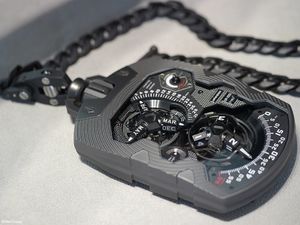
The devices measure both potential Aether energies as well as the disruption / displacement within a local Aether field. The unit of measure for this displacement is called the Oswald symbolized by the cyrillic character Yu (Ю). This measurement measures the displacement of Aether within a region, the official scientific definition is a measure of the aethic displacement requires to alter the local aether field by 1 Aethic-Volt symbolized by the cyrillic Iotated A (Ꙗ). The Oswald is used to measure the presence of a disturbance in the Aether over time.
An Athrometer is a rare technology, developed in the Victorian Era on Earth but perfected in the late 20th century. The device uses Videns Autem Magia crystals placed within the mechanics, the electricity produced is turned into mechanical energy through the clever use of distinct materials which expand and contract when micro-voltage of applied from the crystals. The device is then carefully calibrated so that it can provide reliable strength and approximate bearing of source. Dials and adjustments on the device allow for it to be calibrated and adjusted to focus on detecting specific kinds of non-conventional energy and the types of patterns they create.
Aethic-Volt
This unit measures the potential aethic-energy stored within a region. In terms of magical energy it measures the potential energy build-up within a region in the local Aether outside the body. In terms of psionic energy it measures the converse, the potential build-up of energy within the body's Aether. In both cases the energy measured is the potential energy prior to equalization or release toward a particular unit of work. Similar terminology exists of the Aethic-Watt and Aether-Ampere describing the interaction and usage of Aether as a form of energy. Though the relationship between the 3 units is similar to that of their physics counterparts, their related calculations is different.
In most practical cases of measuring the Aether in a region of space, the Aethic-Volt and the Oswald are the two primary units of measure.
Origin of the Oswald
The unit of measure is named after Oswald Coldstone a resident of England during the height of the study of the occult in Europe. Coldstone was different in that he actually had some family ties to the study of magic and the supernatural. His grandfather passed on to him an Athrometer, which he spent his life studying both the construction and use of.
Coldstone described the intensity of magic, psionics, and supernatural entities in terms of the disturbance they leave upon the surrounding world, calling this the supracorporeal shadow. He measured this as a positive integer computed from the difference between what he called the supracorporeal and the infracorporeal. Through this he measured the movement of Aether from outside the body to the inside. He further perfected this and discovered a mathematical representation of this using differential mathematics. Having consulted with some of the best minds of a the time, he perfected modifications to the Athrometer allowing it to measure both the direct intensity of the local energy but also calculate the supracorporeal shadow.
Construction
The devices are constructed largely by hand and have never been mass produced. The construction methods were taught to very few groups over time, starting with the device's invention in Victorian London to serve the purposes of a group of investigators of strange occurrences in the city. The design was then passed down and taught to people as needed, the original group which designed it taught many others in many countries how to construction the items and thus many variations exist for various secret societies and police and law enforcement forces throughout the world.
Rarity in the 21st Century
The devices are not very common in the contemporary time periods of 20th and 21st century but are not so rare that they do not exist or are unknown to groups who are serious about investigation of strange occurrences. However, it requires unique knowledge to build one, such knowledge must be gained from one of the groups or organizations (or individuals) who already has it, the designs are unpublished and several groups work hard to keep it that way. Hand written and drawn designs do exist and can be obtained, largely on the black market for large sums of money.
Rarity in the 24th Century
By the 24th century most of the knowledge required to construct these devices has been lost to time over multiple wars, though some of the devices still exist. Similar devices have been constructed, in a crude sense, using similar ideas. However, these devices when properly used can be even more precise than their 24th century equivalents. As such the devices are exceptionally rare in the 24th centuries, mostly in collections and museums where their original purpose is unknown.
The organization of Vident Obscura has retained a number of the devices and also has methods of producing such a device. They also have devised ways to integrating the functions of the device into modern sensing equipment. Such technology is a closely guarded secret, however, and very well protected.